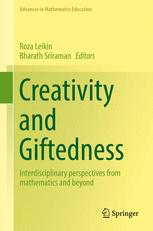

Most ebook files are in PDF format, so you can easily read them using various software such as Foxit Reader or directly on the Google Chrome browser.
Some ebook files are released by publishers in other formats such as .awz, .mobi, .epub, .fb2, etc. You may need to install specific software to read these formats on mobile/PC, such as Calibre.
Please read the tutorial at this link: https://ebookbell.com/faq
We offer FREE conversion to the popular formats you request; however, this may take some time. Therefore, right after payment, please email us, and we will try to provide the service as quickly as possible.
For some exceptional file formats or broken links (if any), please refrain from opening any disputes. Instead, email us first, and we will try to assist within a maximum of 6 hours.
EbookBell Team

0.0
0 reviewsThis volume provides readers with a broad view on the variety of issues related to the educational research and practices in the field of Creativity in Mathematics and Mathematical Giftedness. The book explores (a) the relationship between creativity and giftedness; (b) empirical work with high ability (or gifted) students in the classroom and its implications for teaching mathematics; (c) interdisciplinary work which views creativity as a complex phenomena that cannot be understood from within the borders of disciplines, i.e., to present research and theorists from disciplines such as neuroscience and complexity theory; and (d) findings from psychology that pertain the creatively gifted students. As a whole, this volume brings together perspectives from mathematics educators, psychologists, neuroscientists, and teachers to present a collection of empirical, theoretical and philosophical works that address the complexity of mathematical creativity and giftedness, its origins, nature, nurture and ways forward. In keeping with the spirit of the series, the anthology substantially builds on previous ZDM volumes on interdisciplinarity (2009), creativity and giftedness (2013).